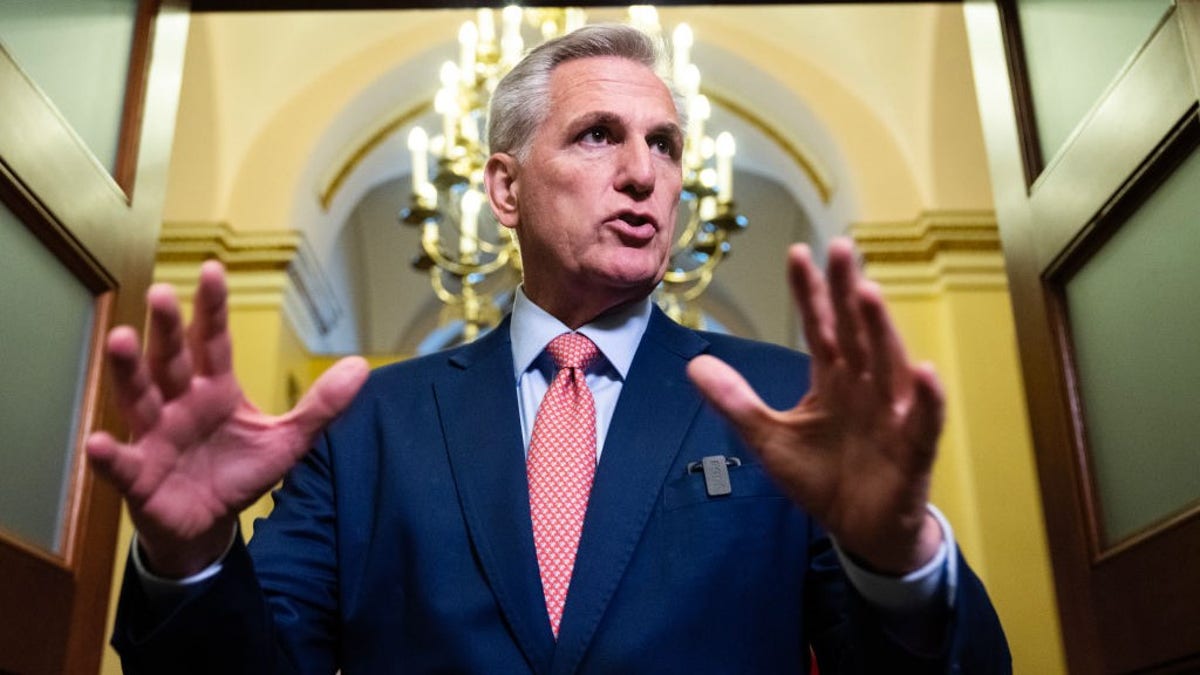
House lawmakers voted to pass three of four appropriations bills brought to the floor on Thursday night, with defense spending passing along bipartisan lines while their bill on agriculture and FDA spending was sunk by both Republicans and Democrats.
The House GOP majority has now passed four of the 12 individual spending bills it promised to get across the finish line to fund the government for the next fiscal year.
The passage is a modest win for House Republicans after over a week of chaos and disagreements that saw multiple attempts to advance spending bills fail or scuttled altogether. However, a government shutdown is still growing likely with less than two days for the House and Senate to agree on a deal before the Oct. 1 midnight deadline.
Republicans’ defense spending bill passed 218 to 210, with Democrat Reps. Jared Golden of Maine and Marie Gluesenkamp Perez of Washington joining the GOP to pass it. Republican Reps. Tim Burchett of Tennessee and Ken Buck of Colorado voted against it.
Procedural votes to advance the defense spending bill failed on the House floor twice last week amid disagreements over how to forge ahead with funding the government.
The bill itself was in danger of failing again earlier this week over GOP objections to $300 million in Ukraine aid in its provisions, but that funding was stripped out in an emergency Rules Committee meeting on Wednesday night.
A separate vote on whether to send that money to Kyiv saw support from all 210 Democrats present, while over half of the GOP conference voted against it. That bill ultimately passed 311 to 117.
A bill aimed at funding the State Department and foreign operations also passed, despite also being expected to face trouble over Ukraine aid measures. Republican Rep. Marjorie Taylor Greene of Georgia voted against it for that reason. Moderate GOP Rep. Brian Fitzpatrick of Pennsylvania, a supporter of Ukraine aid, also shot it down.
Meanwhile, the same two Democrats who voted for the defense spending bill, despite a host of conservative measures on abortion and transgender care that the left largely opposed, also joined Republicans to pass funding for the Department of Homeland Security.
In the end, however, Republicans could not muster enough support within their conference to pass appropriations for agriculture and the FDA — 27 moderates and farm district conservatives banded together to oppose the bill. The former objected to the limits the bill placed on mail-order abortion medication known as mifepristone, while the latter was uneasy about whether the bill provided enough funding to critical rural initiatives.
That bill failed in a decisive 191-237 vote.
It is virtually impossible for GOP leaders to shepherd eight more spending bills to the House floor before midnight on Oct. 1. House Speaker Kevin McCarthy is planning to hold a vote on a stopgap funding measure, known as a continuing resolution, on Friday.
However, the Senate and House are still far apart on everything from spending toplines to policy points, meaning lawmakers will likely be left negotiating through a partial government shutdown.

House lawmakers voted to pass three of four appropriations bills brought to the floor on Thursday night, with defense spending passing along bipartisan lines while their bill on agriculture and FDA spending was sunk by both Republicans and Democrats.
The House GOP majority has now passed four of the 12 individual spending bills it promised to get across the finish line to fund the government for the next fiscal year.
The passage is a modest win for House Republicans after over a week of chaos and disagreements that saw multiple attempts to advance spending bills fail or scuttled altogether. However, a government shutdown is still growing likely with less than two days for the House and Senate to agree on a deal before the Oct. 1 midnight deadline.
Republicans’ defense spending bill passed 218 to 210, with Democrat Reps. Jared Golden of Maine and Marie Gluesenkamp Perez of Washington joining the GOP to pass it. Republican Reps. Tim Burchett of Tennessee and Ken Buck of Colorado voted against it.
Procedural votes to advance the defense spending bill failed on the House floor twice last week amid disagreements over how to forge ahead with funding the government.
The bill itself was in danger of failing again earlier this week over GOP objections to $300 million in Ukraine aid in its provisions, but that funding was stripped out in an emergency Rules Committee meeting on Wednesday night.
A separate vote on whether to send that money to Kyiv saw support from all 210 Democrats present, while over half of the GOP conference voted against it. That bill ultimately passed 311 to 117.
A bill aimed at funding the State Department and foreign operations also passed, despite also being expected to face trouble over Ukraine aid measures. Republican Rep. Marjorie Taylor Greene of Georgia voted against it for that reason. Moderate GOP Rep. Brian Fitzpatrick of Pennsylvania, a supporter of Ukraine aid, also shot it down.
Meanwhile, the same two Democrats who voted for the defense spending bill, despite a host of conservative measures on abortion and transgender care that the left largely opposed, also joined Republicans to pass funding for the Department of Homeland Security.
In the end, however, Republicans could not muster enough support within their conference to pass appropriations for agriculture and the FDA — 27 moderates and farm district conservatives banded together to oppose the bill. The former objected to the limits the bill placed on mail-order abortion medication known as mifepristone, while the latter was uneasy about whether the bill provided enough funding to critical rural initiatives.
That bill failed in a decisive 191-237 vote.
It is virtually impossible for GOP leaders to shepherd eight more spending bills to the House floor before midnight on Oct. 1. House Speaker Kevin McCarthy is planning to hold a vote on a stopgap funding measure, known as a continuing resolution, on Friday.
However, the Senate and House are still far apart on everything from spending toplines to policy points, meaning lawmakers will likely be left negotiating through a partial government shutdown.














